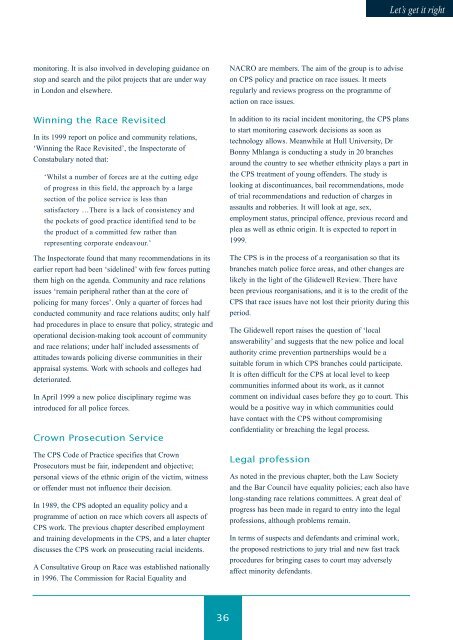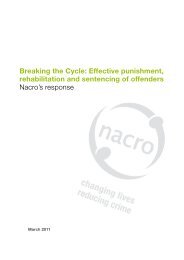Let's get it right: race and justice 2000 - Nacro
Let's get it right: race and justice 2000 - Nacro
Let's get it right: race and justice 2000 - Nacro
- No tags were found...
You also want an ePaper? Increase the reach of your titles
YUMPU automatically turns print PDFs into web optimized ePapers that Google loves.
Let’s <strong>get</strong> <strong>it</strong> <strong>right</strong>mon<strong>it</strong>oring. It is also involved in developing guidance onstop <strong>and</strong> search <strong>and</strong> the pilot projects that are under wayin London <strong>and</strong> elsewhere.Winning the Race Revis<strong>it</strong>edIn <strong>it</strong>s 1999 report on police <strong>and</strong> commun<strong>it</strong>y relations,‘Winning the Race Revis<strong>it</strong>ed’, the Inspectorate ofConstabulary noted that:‘Whilst a number of forces are at the cutting edgeof progress in this field, the approach by a largesection of the police service is less thansatisfactory …There is a lack of consistency <strong>and</strong>the pockets of good practice identified tend to bethe product of a comm<strong>it</strong>ted few rather thanrepresenting corporate endeavour.’The Inspectorate found that many recommendations in <strong>it</strong>searlier report had been ‘sidelined’ w<strong>it</strong>h few forces puttingthem high on the agenda. Commun<strong>it</strong>y <strong>and</strong> <strong>race</strong> relationsissues ‘remain peripheral rather than at the core ofpolicing for many forces’. Only a quarter of forces hadconducted commun<strong>it</strong>y <strong>and</strong> <strong>race</strong> relations aud<strong>it</strong>s; only halfhad procedures in place to ensure that policy, strategic <strong>and</strong>operational decision-making took account of commun<strong>it</strong>y<strong>and</strong> <strong>race</strong> relations; under half included assessments ofatt<strong>it</strong>udes towards policing diverse commun<strong>it</strong>ies in theirappraisal systems. Work w<strong>it</strong>h schools <strong>and</strong> colleges haddeteriorated.In April 1999 a new police disciplinary regime wasintroduced for all police forces.Crown Prosecution ServiceThe CPS Code of Practice specifies that CrownProsecutors must be fair, independent <strong>and</strong> objective;personal views of the ethnic origin of the victim, w<strong>it</strong>nessor offender must not influence their decision.In 1989, the CPS adopted an equal<strong>it</strong>y policy <strong>and</strong> aprogramme of action on <strong>race</strong> which covers all aspects ofCPS work. The previous chapter described employment<strong>and</strong> training developments in the CPS, <strong>and</strong> a later chapterdiscusses the CPS work on prosecuting racial incidents.A Consultative Group on Race was established nationallyin 1996. The Commission for Racial Equal<strong>it</strong>y <strong>and</strong>NACRO are members. The aim of the group is to adviseon CPS policy <strong>and</strong> practice on <strong>race</strong> issues. It meetsregularly <strong>and</strong> reviews progress on the programme ofaction on <strong>race</strong> issues.In add<strong>it</strong>ion to <strong>it</strong>s racial incident mon<strong>it</strong>oring, the CPS plansto start mon<strong>it</strong>oring casework decisions as soon astechnology allows. Meanwhile at Hull Univers<strong>it</strong>y, DrBonny Mhlanga is conducting a study in 20 branchesaround the country to see whether ethnic<strong>it</strong>y plays a part inthe CPS treatment of young offenders. The study islooking at discontinuances, bail recommendations, modeof trial recommendations <strong>and</strong> reduction of charges inassaults <strong>and</strong> robberies. It will look at age, sex,employment status, principal offence, previous record <strong>and</strong>plea as well as ethnic origin. It is expected to report in1999.The CPS is in the process of a reorganisation so that <strong>it</strong>sbranches match police force areas, <strong>and</strong> other changes arelikely in the light of the Glidewell Review. There havebeen previous reorganisations, <strong>and</strong> <strong>it</strong> is to the cred<strong>it</strong> of theCPS that <strong>race</strong> issues have not lost their prior<strong>it</strong>y during thisperiod.The Glidewell report raises the question of ‘localanswerabil<strong>it</strong>y’ <strong>and</strong> suggests that the new police <strong>and</strong> localauthor<strong>it</strong>y crime prevention partnerships would be asu<strong>it</strong>able forum in which CPS branches could participate.It is often difficult for the CPS at local level to keepcommun<strong>it</strong>ies informed about <strong>it</strong>s work, as <strong>it</strong> cannotcomment on individual cases before they go to court. Thiswould be a pos<strong>it</strong>ive way in which commun<strong>it</strong>ies couldhave contact w<strong>it</strong>h the CPS w<strong>it</strong>hout compromisingconfidential<strong>it</strong>y or breaching the legal process.Legal professionAs noted in the previous chapter, both the Law Society<strong>and</strong> the Bar Council have equal<strong>it</strong>y policies; each also havelong-st<strong>and</strong>ing <strong>race</strong> relations comm<strong>it</strong>tees. A great deal ofprogress has been made in regard to entry into the legalprofessions, although problems remain.In terms of suspects <strong>and</strong> defendants <strong>and</strong> criminal work,the proposed restrictions to jury trial <strong>and</strong> new fast trackprocedures for bringing cases to court may adverselyaffect minor<strong>it</strong>y defendants.36

















